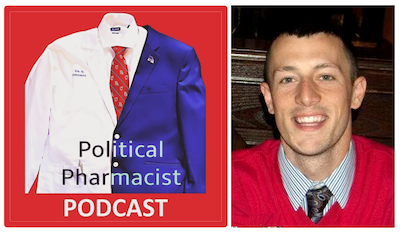Student leaders discuss health care policy on 'The Political Pharmacist' podcast
The health care sector, specifically pharmaceuticals, is one of the most regulated industries in the United States. In relation to the economy and government spending, health care is also one of the major drivers of the growing national debt. These are just some of the topics discussed by Wayne State student leaders from the student affiliate of the National Pharmaceutical Association (SNPhA), Student College of Clinical Pharmacy (SCCP) and the Mu Omicron Pi chapter of Kappa Psi Pharmaceutical Fraternity on The Political Pharmacist podcast.

Hosted by pharmacist Eric Geyer, the podcast focuses on the political side of pharmacy, advocating for changes in health care and providing calls to action for better health outcomes. WSU Applebaum student pharmacists Daniel Frederick, Joseph Paul Javier and Hussein Safaoui recently guested on The Political Pharmacist representing the Wayne State Up to Us team.
"As future pharmacists, we must understand how legislation influences our role as health care providers," says Safaoui, health policy liaison for Up to Us and SCCP external vice president. "With such a complex system, it is at this level where we can make the greatest impacts concerning health outcomes, patient access, and drug development."
Regarding the fact that the U.S. national debt has already grown to over $27 trillion, podcast host Eric Geyer responded: "Health care is such a cornerstone of our economy and the national debt is a huge topic, no matter which side of the aisle you are on. A lot of money is being spent that could be spent in other places to improve the economy and improve the health of Americans."

"It is important to become involved with pharmacy law and policy as a student in order to steer your profession in the best direction before you even enter the job market," said Frederick, Kappa Psi president. "Our entire chapter of Kappa Psi was involved in our advocacy efforts including emailing politicians, meeting with legislators and informing constituents about specific health care-related policy. We plan to continue our advocacy efforts and get more students involved."
Javier, who worked as a broadcaster and journalist before entering pharmacy school, said, "There are so many ways and platforms that we can use to advocate for our profession. From writing to lawmakers, staying informed on legislation that affects health care, posting about it on social media, and speaking out on programs like The Political Pharmacist, it is imperative that we play an active role in shaping policy that will benefit the profession and bring about the best results for our patients in terms of increased access to health care and life-saving prescription medications for all Americans."
Listen to the Wayne State episode of The Political Pharmacist here.